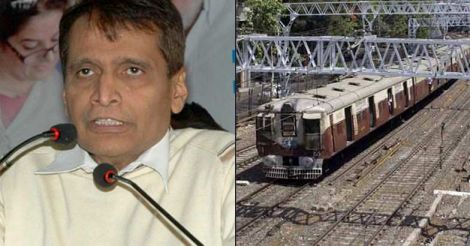When Railway Minister Suresh Prabhu did not announce new trains in his budget speech, the joke was that he was more efficient at launching expert committees.
When Prabhu, who was hand picked by Narendra Modi to steer the largest public enterprise, found the Railways in a mess, he felt it needed expertise to change the way the Railways have worked for more than a century. He roped in experts such as former comptroller and auditor general Vinod Rai, economist Bibek Debroy and several others to help him transform the Railways into an efficient, revenue generating and transparent enterprise, by addressing problems of capacity under-utilisation and wastage. Prabhu believed the management structure belonged to the twentieth century and there is too much power concentrated with the Railway Minister and the board.
While Rai, who refused to accept any pay or have an office, has given important advice of making transactions transparent and ethical, it is Debroy who has stirred a hornet's nest with his recommendations. Actually it was the short term railway minister D.V. Sadananda Gowda who had said the railway board would be reformed. But Prabhu asked Debroy to suggest comprehensive reforms.
Debroy is also a member of Niti Aayog, which has replaced the planning commission. Till now, Debroy was famous for two activities: he had researched and prepared a list of more than 5000 obsolete laws of central and state governments, which need to be scrapped. Second, for his modernistic translation of Mahabharata into English.
His report recommends the dismantling of the present structure where the minister and the board decide on policy, operations and regulation. He wants the ministry to only look after policy making, including future privatisation.
The railway zones, which are totally under the ministry, would become autonomous and run their own trains and affairs. They could become government-owned corporations, which will help them raise huge capital from the market. They could have arrangements with each other for running inter-zonal goods and passenger trains.
As railway engine and coach making factories also become independent corporations, each state would place purchase orders instead of centralised allocation by the centre. To ensure fair competition, Debroy mooted a regulatory authority to decide on standards, freight charges and passenger fares. According to Debroy, there is no need for a separate railway budget once the trifurcation happens.
The report, which is yet to be accepted by the government, has caused a furore in both the corridors of railway board as well as in railway stations across the country. The unions representing 13 lakh workforce have asked Prabhu not to touch the report even with a pair of tongs.
The unions are sure Debroy has prepared the roadmap to hand over the railways to private players, as it has enormous assets in terms of land in prime urban areas and the railway services will be a money spinner. As every Lok Sabha member depends on Railways to satisfy the legitimate demands of his voters for more trains, stops and facilities, they wouldn't like pure commercial considerations determine these criteria. MPs also cannot digest the suggestion to do away with the railway budget.
Now it is up to Prabhu to determine what can be adopted from the Debroy report and use his skills to get political support within his new party ( he joined BJP one hour before becoming the minister) and then in the extended railway family and finally, in Parliament. If Modi succeeds in these reforms, he would be treading a different path from the populism of his predecessors A.B. Vajpayee and Manmohan Singh as well as their railway ministers such as Mamata Banerjee, Nitish Kumar, Lalu Prasad and Mallikarjun Kharge.
Tailpiece: After his focussed tour of Central Asia, Modi's team is now concentrating on West Asian countries such as Turkey, Israel, Saudi Arabia, Iran, UAE and Qatar for an intensive tour in the next few months.











































































































































































































































 Prabhu believed the management structure belonged to the twentieth century and there is too much power concentrated with the Railway Minister and the board.
Prabhu believed the management structure belonged to the twentieth century and there is too much power concentrated with the Railway Minister and the board.
Disclaimer
The comments posted here/below/in the given space are not on behalf of Manorama. The person posting the comment will be in sole ownership of its responsibility. According to the central government's IT rules, obscene or offensive statement made against a person, religion, community or nation is a punishable offense, and legal action would be taken against people who indulge in such activities.